Ocean Sciences
UCAS code F700
- Study mode
- Full-time
- Duration
- 3 years
- Start date and application deadlines
-
- Start date
UCAS code F700
Our Ocean Sciences programme takes an interdisciplinary approach to understanding the ocean environment. With fieldwork opportunities embedded in each year of the course and our strong links to the National Oceanography Centre, Liverpool is an excellent place to study Ocean Sciences.
The ocean plays a central role in the Earth’s climate system by regulating the transfer of heat and carbon over the globe. The effect of the ocean on Earth’s climate and on life can only be fully understood by addressing the fundamental biological, physical and chemical processes operating in the environment. This degree route takes a multidisciplinary approach to developing an understanding of the ocean and climate system.
We have strong links with scientists from the National Oceanography Centre in Liverpool, who provide guest lectures and supervision of projects.
On the Ocean Science programme you will acquire a broad interdisciplinary understanding of the ocean environment from a physical, chemical and biological perspective. The oceanography route is suitable if you don’t have a strong background in mathematics, physics or chemistry as remedial courses are provided.
This programme has an important focus on practical aspects of marine science and will provide grounding in hands-on quantitative studies of biological, chemical and physical marine science. There will be the opportunity to participate in field/project work throughout the course of your studies, as well as a full sea practical during year three. You will undertake a major research project in your final year. The degree in Ocean Sciences at Liverpool is accredited by the Institute of Marine Engineering, Science and Technology.
A number of the School’s degree programmes involve laboratory and field work. Fieldwork is carried out in various locations, ranging from inner city to coastal and mountainous environments. We consider applications from prospective disabled students on the same basis as all other students, and reasonable adjustments will be considered to address barriers to access.
The degree in Ocean Sciences at Liverpool is accredited by the Institute of Marine Engineering, Science and Technology.
IMarEST - The Institute of Maring Engineering, Science and Techonology - is the international professional body for all marine professionals.

We’re proud to announce we’ve been awarded a Gold rating for educational excellence.
Discover what you'll learn, what you'll study, and how you'll be taught and assessed.
Students are pre-registered for ENVS128; students wanting a more advanced maths module can switch to ENVS117.
Programme details and modules listed are illustrative only and subject to change.
| Optional modules | Credits |
|---|---|
| CATCHMENT HYDROLOGY (ENVS217) | 15 |
| CLIMATOLOGY (ENVS231) | 15 |
| GEOMORPHOLOGY: ICE, SEA AND AIR (ENVS252) | 15 |
| CHANGING ENVIRONMENTS (ENVS214) | 15 |
Programme details and modules listed are illustrative only and subject to change.
| Compulsory modules | Credits |
|---|---|
| OCEAN CARBON AND CLIMATE (ENVS335) | 15 |
| CONTEMPORARY ISSUES IN OCEAN AND CLIMATE SCIENCES (ENVS366) | 15 |
| OCEAN DYNAMICS (ENVS332) | 15 |
| SEA PRACTICAL (ENVS349) | 30 |
| INDEPENDENT RESEARCH PROJECT (ENVS306) | 30 |
| Optional modules | Credits |
|---|---|
| COASTAL ENVIRONMENTS: SPATIAL AND TEMPORAL CHANGE (ENVS376) | 15 |
| CARBON, NUTRIENTS AND CLIMATE CHANGE MITIGATION (ENVS381) | 15 |
| MODELLING ENVIRONMENTAL SYSTEMS (ENVS397) | 15 |
Programme details and modules listed are illustrative only and subject to change.
Teaching takes place through lectures, practicals, workshops, seminars, tutorials and computer based learning, with an emphasis on learning through doing.
Students value the learning opportunities provided by field classes, including the rapid feedback on performance. You will typically receive at least 15 hours of formal teaching each week. Between 30 and 100 hours of fieldwork and hands-on activities are provided each year depending on the discipline.
A typical module might involve two or three one-hour lectures each week, and often a three- hour laboratory or computer-based practical as well. Tutorials typically involve groups of 4-7 students meeting with a member of staff at least every two weeks in year one and two. In year three, you will undertake an Honours project, which is a piece of independent research (field, laboratory or data analysis) on a topic of your choice, supervised by a member of staff. In years three and four students meet with their project supervisor on a weekly or more frequent basis. As you progress through your degree, you will be increasingly challenged to engage with current debates, to think critically and to study independently.
A number of the School’s degree programmes involve laboratory and field work. The field work is carried out in various locations, ranging from inner city to coastal and mountainous environments. We consider applications from prospective students with disabilities on the same basis as all other students, and reasonable adjustments will be considered to address barriers to access.
Assessment matches the learning objectives for each module and may take the form of written exams, coursework submissions in the form of essays, scientific papers, briefing notes or lab notebooks, oral and poster presentations and contributions to group projects. Coursework is designed around the types of problems encountered, and the skills needed, in commercial, research and public sector jobs. Emphasis is placed on good laboratory practice and maintaining useful lab notebooks in the context of scientific integrity and scientific data management.
We have a distinctive approach to education, the Liverpool Curriculum Framework, which focuses on research-connected teaching, active learning, and authentic assessment to ensure our students graduate as digitally fluent and confident global citizens.
The Liverpool Curriculum framework sets out our distinctive approach to education. Our teaching staff support our students to develop academic knowledge, skills, and understanding alongside our graduate attributes:
Our curriculum is characterised by the three Liverpool Hallmarks:
All this is underpinned by our core value of inclusivity and commitment to providing a curriculum that is accessible to all students.
The qualifications and exam results you'll need to apply for this course.
| Qualification | Details |
|---|---|
| A levels |
BBC |
| BTEC Level 3 national extended diploma |
DDM. Forensic Science is not accepted. |
| BTEC combinations |
BTEC National Extended Certificate M plus BB including two science subjects at A level. |
| Welsh Baccalaureate Advanced |
Grade B, plus grades BC at A level including two science subjects. |
| Access |
Pass relevant Access to HE Diploma with 45 Level 3 credits with 27 at Distinction and 18 at Merit |
Studying with us means you can tailor your degree to suit you. Here's what is available on this course.
University of Liverpool students can choose from an exciting range of study placements at partner universities worldwide. Choose to spend a year at XJTLU in China or a year or semester at an institution of your choice.
Immerse yourself in Chinese culture on an optional additional year at Xi'an Jiaotong Liverpool University in stunning Suzhou.
Broaden your world by spending an additional year of study at a partner university abroad following your second year of study.
Take a semester of your second year of study at one of our worldwide partner institutions.
Spend a summer abroad on a study placement or research project at one of our worldwide partner institutions.
Year in industry placements give you an in-depth workplace experience where you can develop your skills and apply your learning.
You don't need to decide now - you can choose to add a year in industry after you've begun your degree.
To spend a year in industry, you'll need to secure a placement with an organisation. If you're unable to find a placement, you'll continue with the standard version of the course without a year in industry.
Every student at The University of Liverpool can study a language as part of, or alongside their degree. You can choose:
Teaching takes place in well-equipped lecture theatres and seminar rooms across the University campus, including in our award-winning Central Teaching Laboratory.
Your course will be delivered by staff from the Department of Earth, Ocean and Ecological Sciences, all of whom are actively involved in ocean research and who bring the results of their research into your lectures and laboratories. Our staff collaborate with scientists from the National Oceanography Centre, which has a research centre on the Liverpool campus.
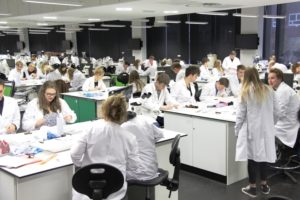
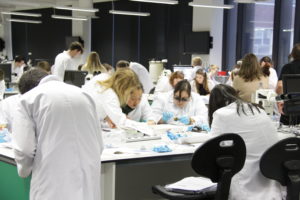
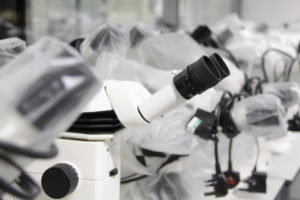
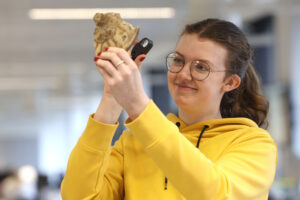
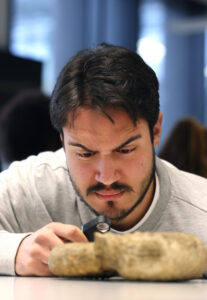

From arrival to alumni, we’re with you all the way:

Want to find out more about student life?
Chat with our student ambassadors and ask any questions you have.
Our degree programmes are designed to provide you with the skills to tackle these global environmental challenges.
After completing this course, the employability options are extensive and include:
89.5% of environmental sciences students are in work and/or further study 15 months after graduation.
(Discover Uni, 2018-19.)
Your tuition fees, funding your studies, and other costs to consider.
Full-time place, per year - £9,535
Year in industry fee - £1,905
Year abroad fee - £1,430 (applies to year in China)
Full-time place, per year - £29,100
Year in industry fee - £1,905
Year abroad fee - £14,550 (applies to year in China)
The tuition fees shown are correct for 2025/26 entry. Please note that the year abroad fee also applies to the year in China.
Tuition fees cover the cost of your teaching and assessment, operating facilities such as libraries, IT equipment, and access to academic and personal support. Learn more about paying for your studies.
We understand that budgeting for your time at university is important, and we want to make sure you understand any course-related costs that are not covered by your tuition fee. This could include expenses such as field clothing and sustenance (food and drinks) during fieldwork.
Find out more about the additional study costs that may apply to this course.
We offer a range of scholarships and bursaries that could help pay your tuition and living expenses.
If you’re a UK student joining an undergraduate degree and have a household income below £35,000, you could be eligible for a Liverpool Bursary worth up to £2,000 for each year of undergraduate study.
Apply for an Asylum Seekers Scholarship and you could have your tuition fees paid in full and receive help with study costs. You’ll need to have applied for asylum in the UK, or be the dependant of an asylum seeker, and be joining an eligible undergraduate degree.
If you’ve spent 13 or more weeks in Local Authority care since age 14, you could be eligible for a bursary of £3,000 per year of study. You’ll need to be a UK student joining an eligible undergraduate degree and be aged 28 or above on 1 September in the year you start.
Are you a UK student with a Black African or Caribbean heritage and a household income of £25,000 or less? You could be eligible to apply for a Cowrie Foundation Scholarship worth up to £8,000 for each year of undergraduate study.
If you’re a UK student identified as estranged by Student Finance England (or the equivalent UK funding body), you could be eligible for a bursary of £1,000 for each year of undergraduate study.
Joining a School of Biosciences degree and have a household income of less than £25,000? If you’re a UK student, you could apply to receive £4,500 per year for three years of your undergraduate course.
Do you live in the Liverpool City Region with a household income of £25,000 or less? Did neither of your parents attend University? You could be eligible to apply for a Nolan Scholarship worth £5,000 per year for three years of undergraduate study.
Are you a UK student with a household income of £25,000 or less? If you’ve participated in an eligible outreach programme, you could be eligible to apply for a Rigby Enterprise Award worth £5,000 per year for three years of your undergraduate degree.
Are you a UK student with a household income of £25,000 or less? Did neither of your parents attend University? You could be eligible to apply for a ROLABOTIC Scholarship worth £4,500 for each year of your undergraduate degree.
Apply to receive tailored training support to enhance your sporting performance. Our athlete support package includes a range of benefits, from bespoke strength and conditioning training to physiotherapy sessions and one-to-one nutritional advice.
Joining a degree in the School of Electrical Engineering, Electronics and Computer Science? If you’re a UK student with household income below £25,000, you could be eligible to apply for £5,000 a year for three years of study. Two awards will be available per academic year.
If you’re a young adult and a registered carer in the UK, you might be eligible for a £1,000 bursary for each year of study. You’ll need to be aged 18-25 on 1 September in the year you start your undergraduate degree.
Use our handy chatbot for your Clearing enquiries.
Last updated 17 June 2025 / / Programme terms and conditions